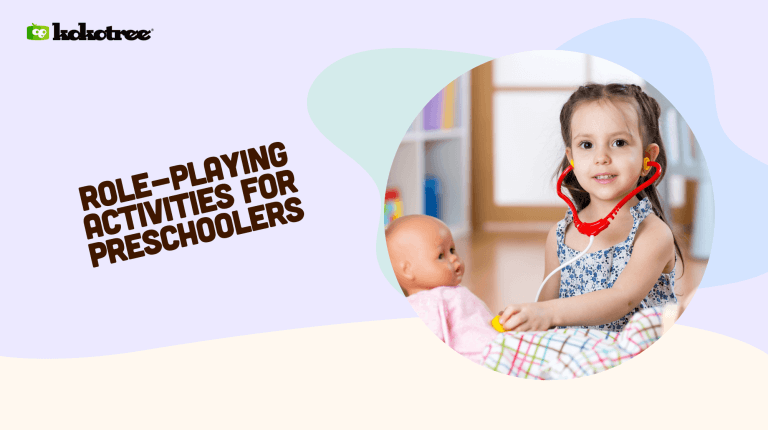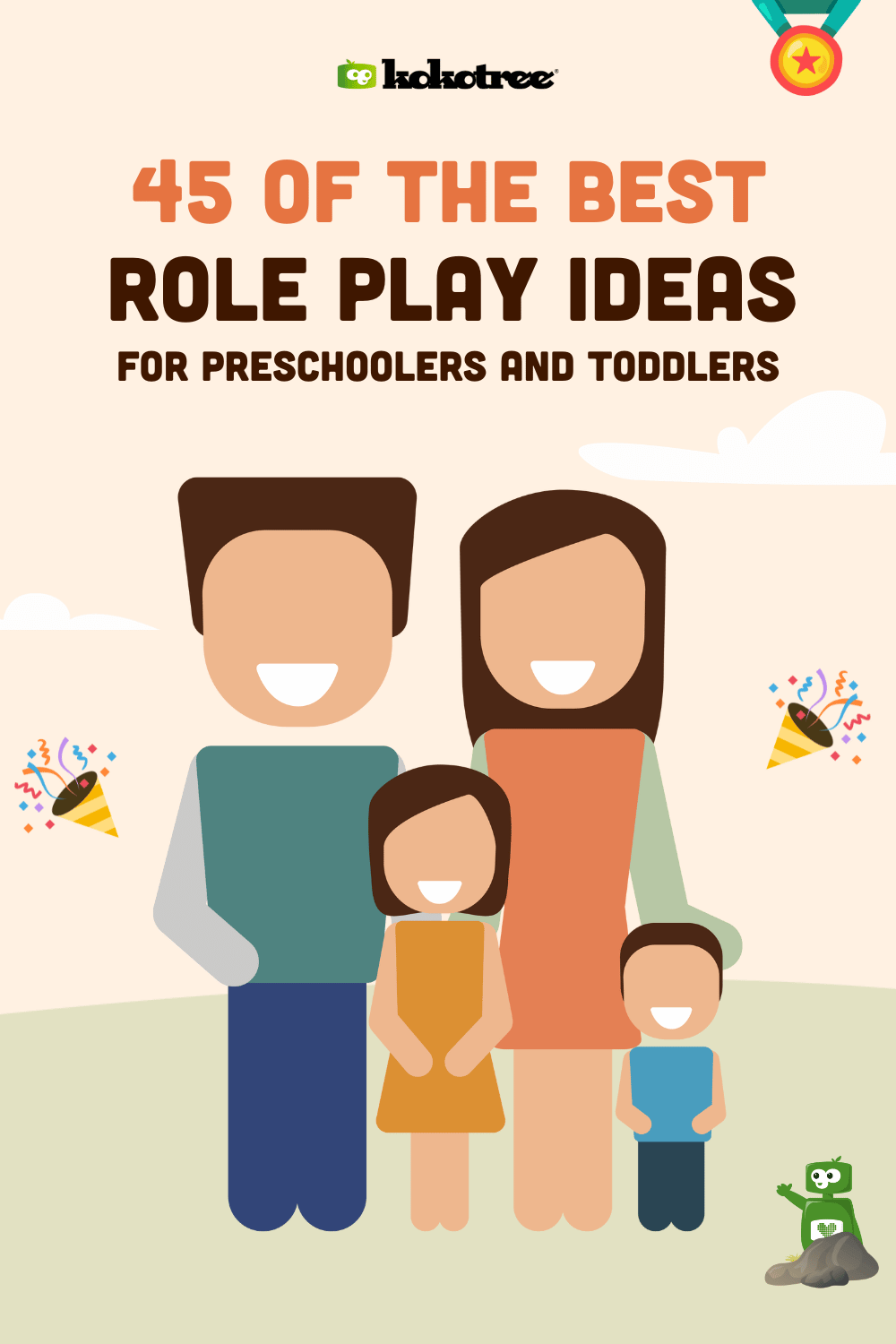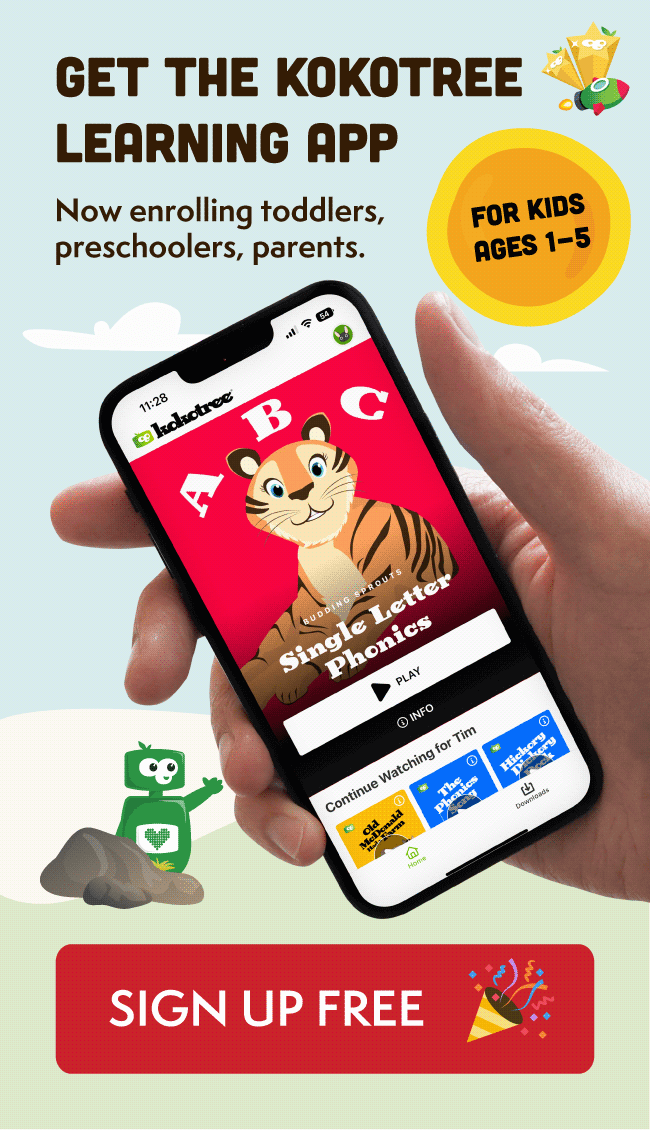

Searching for creative and educational role play ideas for your toddler or preschooler? Look no further!
Our comprehensive guide offers 45 simple yet engaging activities that entertain and contribute to your child’s cognitive and social development.
Dive in and let the imaginative play begin!
Role-playing is a preschool activity where children take on the roles of different characters and enact various scenarios. This can be as simple as playing house, where one child becomes the parent and another the child, to more complex situations like a classroom setting, grocery store, or even a spaceship traveling to Mars.
Role play can be guided by the children themselves or facilitated by adults. The scenarios are generally symbolic and imaginative, helping children explore different roles and settings.
Cognitive Development: Role play can help children understand the world around them and is excellent for cognitive development, including problem-solving and critical thinking.
Language Skills: It aids in language development by expanding their vocabulary and enabling them to practice sentence structure and dialogue.
Emotional and Social Skills: Role play teaches empathy and social skills, as children have to put themselves in someone else’s shoes. It helps in understanding social roles and rules like sharing, cooperation, and taking turns.
Creativity: By engaging in imaginative scenarios, children can stretch their creativity and think outside the box.
Real-world Practice: Role play can also be a safe way for kids to practice and understand roles they see in everyday life, such as those of doctors, firefighters, or teachers.
Self-confidence: Successfully navigating role-play scenarios can also build self-esteem and self-confidence, as children realize they can be anything they want to be.
Children of all ages can benefit from role-playing, although the complexity of the play will naturally evolve as they grow. While toddlers might engage in simpler, more imaginative play like mimicking animal sounds, older children may create intricate storylines with more realistic premises and ethical dilemmas.
Role play is incredibly versatile and can be done almost anywhere—indoors, outdoors, at home, or in educational settings. Some role play might require props or costumes, but many scenarios require nothing more than imagination.
Getting started is often as simple as proposing a scenario or setting to the child or group of children and letting them take it from there. For example, you might say, “Let’s pretend we’re astronauts landing on a new planet. What do we find?” Then, allow the children to guide the scenario, stepping in only to facilitate or enhance the play.

Imagination knows no bounds, especially in children. Encouraging role play in toddlers and preschoolers can be a phenomenal way to enhance cognitive, linguistic, and social skills. Here are 45 simple role-play ideas to ignite your child’s creativity and learning.
Create a small grocery store using items from your pantry. One child can be the shopper, while the other can act as the cashier. Use play money to make it more realistic.
A classic role-play scenario where one child plays the doctor, and the other is the patient. This can help alleviate fear of medical appointments and also improve empathetic understanding.
Build a pretend scenario where something is “on fire,” and the child has to rescue stuffed animals or dolls as a firefighter. Safety discussions can be organically woven into the play.
Set the dining table for a restaurant experience. The child can take turns being the customer and the server, learning about manners and customer service.
Turn your living room or backyard into a wildlife safari. Your child can be the guide, teaching you about various animals, which can be either imaginary or based on real animal facts.
The child becomes a mail carrier delivering “letters” (which can be small drawings or notes) to different family members in the house.
One child is the gardener who takes care of the plants (either pretend or real). Discussions can revolve around plant biology and the environment.
Create a map and hide some “treasures” around the home or garden. The child becomes a pirate seeking buried gold, enhancing spatial awareness.
The child acts as a hairstylist, pretending to cut, color, and style the hair of dolls, stuffed animals, or willing family members.
Use cardboard boxes to create a spaceship. The child can be the astronaut, and you can be mission control, guiding them through space.
With a makeshift microphone, the child can become a weather reporter, giving updates and forecasts, helping them learn about meteorological concepts.
One child becomes the teacher and teaches subjects like math, reading, or even art to the other child, who acts as the student.
The child becomes a train conductor, making stops at various “cities” throughout the house, teaching them about transportation and geography.
Transform stuffed animals into zoo residents and let your child be the zookeeper, feeding them and giving tours to visitors.
With toy cars, the child can become a mechanic, “fixing” cars and explaining what’s wrong, boosting fine motor skills and problem-solving abilities.
The child can pretend to bake cakes, cookies, or bread. Family members can then “buy” these items, practicing math skills.
The child turns into a detective, solving mysteries around the house like “who took the cookie from the cookie jar?”
Dress up as superheroes and save the day! This encourages imagination and the concept of good vs. evil.
Use building blocks to create a construction site. Your child can act as the construction worker, building structures while discussing engineering basics.
Create a small fishing pond using a blue sheet and toy fish. Discuss the importance of marine life and ecosystems while “fishing.”
Create a small library using your child’s book collection. They can act as the librarian, lending books and encouraging reading.
Hand your child an old camera or smartphone to become a photographer, capturing the ‘beauty’ of their environment and perhaps discussing what makes a good photo.
With a paper microphone, your child can interview family members about current events, learning about the world in an interactive way.
With some toy binoculars, your child can pretend to be a bird watcher, identifying different birds and learning about ornithology.
Kids can pretend to be kings, queens, knights, and princesses, teaching them about history, governance, and maybe even a little about chivalry.
Discuss the roles of pilots, air traffic controllers, and other airport staff while playing with toy planes.
Create a mini dig site using a sandbox and bury some small ‘artifacts’ for your child to discover.
Map out ‘new lands’ in your home or yard and let your child be the explorer discovering them.
Using stuffed animals as pets, your child can pretend to be a veterinarian and conduct check-ups.
With artificial flowers or drawn pictures of them, your child can pretend to run a flower shop, arranging bouquets and selling them to ‘customers.’
While playing in a small pool or bathtub, the child can pretend to be a lifeguard, ensuring everyone’s safety.
Using a small, empty aquarium or box, kids can pretend to clean and take care of the ‘fish,’ learning about pet care and aquatic life.
Your child can pretend to be a DJ, choosing songs and adjusting ‘controls’ to learn about music and rhythm.
Make an eye chart and have your child conduct eye tests on family members, educating them on the importance of eye health.
With some toy tools, your child can pretend to fix sinks and unblock drains, teaching them basic home maintenance.
Let your child become a tour guide of your home or yard, offering fun facts and ‘historical’ anecdotes about each area.
Have your child assist in a real baking activity, then let them take the lead as the main ‘baker’ in their pretend bakery.
Set up a small ‘camp’ indoors or in your backyard where your child can guide ‘campers’ through different activities.
Create a ‘haunted’ environment with dim lights and strange noises for your child to investigate as a ghost hunter.
Set up a small ‘bank’ where your child can take deposits and give withdrawals, helping them learn about money management.
Use toys or real fruits and vegetables for your child to harvest and take care of as a farmer.
Have some toy cars ready for washing at your child’s pretend car wash station, teaching them about cleanliness and service.
Your child can be a judge in a family talent show, providing them an opportunity to appreciate different skills and talents.
Use recyclable materials for your child to sort into bins, teaching them about recycling and sustainability.
Using a smartphone or toy camera, your child can direct a ‘film,’ enhancing their storytelling and creative skills.
Whether your child is exploring the world as a scientist, capturing memories as a photographer, or healing patients as a doctor, these role-play ideas are designed to stretch their imagination, enhance their social skills, and provide hours of fun. Role-playing is not just about the game; it’s about understanding the world a little better, one imaginative scenario at a time.
Role-playing activities are not just fun and entertaining; they’re a vital part of your child’s developmental journey. These playful scenarios help in boosting cognitive skills, enhancing language and communication, and fostering emotional intelligence.
Through role-playing, children learn to understand the world around them, practice social interactions, and develop empathy. So when you engage in these pretend play activities with your toddler or preschooler, you’re laying a strong foundation for their future.
If you’re wondering how to get started with role-playing, the key is to make the environment inviting. Set the stage with props related to the chosen scenario, such as toy utensils for a “Cooking Show” or fake money for “Grocery Shopping.”
Let your child take the lead, but feel free to guide the narrative. Your involvement not only makes it more fun but also enhances the educational value of the activity.
Safety should always be a priority when it comes to playtime. Always supervise activities that involve small objects to prevent choking hazards. If costumes are involved, make sure they are free of tripping hazards and are flame-resistant.
Additionally, set boundaries and guidelines so that play remains fun and educational, avoiding scenarios that could lead to potential harm or misunderstandings.
The beauty of role-playing activities is that you don’t need extravagant materials. Everyday household items can serve as effective props. For instance, an empty cereal box can become a treasure chest, and a simple bedsheet can transform into a royal cape.
However, if you’re looking to invest, there are plenty of role-play kits available that cater to various themes like medical professionals, firefighters, and even astronauts.
Role-playing is an excellent way for your child to improve their social skills. Involve siblings, friends, or even yourself in these activities. It’s an opportunity for children to learn about teamwork, conflict resolution, and social cues.
When more than one child is involved, the play scenario often becomes more complex, offering greater learning opportunities.
Role-playing is versatile and can be tailored to suit various age groups. For younger toddlers, keep the activities simple. As your child grows, the role-play can become more intricate, introducing elements of problem-solving or even ethical dilemmas. It’s all about calibrating the level of complexity to match your child’s developmental stage.
Believe it or not, role-playing can also offer academic benefits. The act of counting fake money or measuring ingredients for a “Baking Session” can reinforce math skills. Simulating a news reporting scenario can help improve literacy and public speaking skills. Think of these pretend play activities as a fun supplement to more traditional forms of learning.
Q: How can I get my reluctant child interested in role-playing? A: Start by choosing a scenario related to something they already enjoy. If they love animals, a ‘Vet Clinic’ role-play might pique their interest.
Q: How can I guide the play without controlling it? A: Offer prompts or introduce new elements to the scenario, but let your child decide how to incorporate them. The goal is to stimulate, not dictate.




